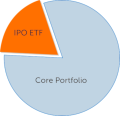One of the largest biotechs of the 2018 IPO market is going public this week. Unity Biotechnology (UBX) plans to raise $85 million at a market cap of $787 million. Its goal? To grasp the holy grail of medicine: a therapy that combats the effects of age.
| Unity Biotechnology Expected to Begin Trading on Thursday, May 3. | ||||
|---|---|---|---|---|
| Issuer Business |
Deal Size Market Cap |
Price Range Shares Filed (mm) |
Top Bookrunners |
|
| Unity Biotechnology (UBX) Brisbane, CA |
$85M $787M |
$16 - $18 5.0 |
Goldman Sachs Morgan Stanley |
|
| Preclinical biotech developing therapies to reduce the effects of aging. | ||||
Sign up for a free trial of our premium platform, IPO Pro. Subscribers get an enhanced IPO profile for Unity, along with data screens, email alerts and exclusive content.
Unity is backed by ARCH Venture and led by an experienced management team, with therapies based on work from the Mayo Clinic. Its drug candidates aim to rid the body of the "zombie-like" senescent cells that increasingly occur with age. These cells cease to divide, refusing to die but doing damage to healthy tissues. The biotech's lead candidate extended the lifespans of mice, and will soon enter Phase 1 trials for osteoarthritis. The company proclaims it has "the most advanced program addressing cellular senescence."
Unity believes its pipeline of preclinical therapies can target a spectrum of age-related conditions, including organ failure and the loss of bone density and cognitive function. Similar to some of the recent immunotherapy cancer biotechs, Unity's market potential is in the tens of billions.
Unity Biotechnology Pipeline:

And yet, getting FDA approval may prove as elusive as the Fountain of Youth.
For one, Unity has not yet tested any of its therapies in humans, and was unable to replicate its mouse results in rats or dogs. Because Unity's therapy affects protein-to-protein interactions, the FDA is likely to require it to proceed cautiously to ensure that intervening biochemically in a natural process will not cause unwanted adverse outcomes. Even the scientists who did the original work are circumspect about its potential in humans.
IPO investors should also pay attention to the asking price. At a proposed market cap of $787 million, only one larger preclinical biotech has gone public in the past 10 years (Cellectis; CLLS). And public investors are being asked to pay $16-$18 per share, 11% more than private investors did just last month ($15.33).
Additionally, this year's biotechs have not been hot IPOs. Currently, just 4 of the 14 have a positive return. resTORbio (TORC), which is also developing treatments for aging-associated diseases, is down 36% from its January IPO.
All in all, Unity Biotechnology looks like a highly-priced, high-potential moonshot. Regardless of how the stock performs initially, Unity is yet another example of a biotech IPO using cutting-edge science to tackle a hugely ambitious goal.


